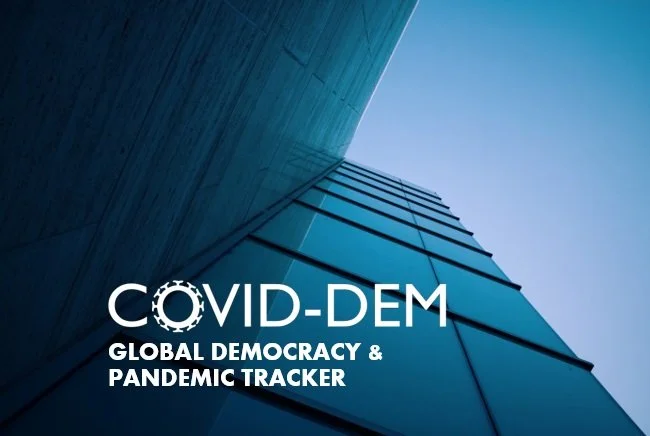DEMOCRATIC DECAY
A GLOBAL CONCERN
-
For the past two decades, concerns have been growing about declines in the health and endurance of constitutional democracy worldwide. Most acutely, we have seen the spread of democratically-elected governments actively dismantling democratic systems or at least challenging key components; especially constraints on executive power such as the political opposition, independent courts and other state bodies (e.g. human rights bodies), the independent media, civil society, and universities.
Moee generally, democracies have also been struggling to address the connected but wider and intensifying challenges of hyper-polarisation, political fragmentation, yawning economic inequality, disengaged and distrustful electorates, and a distorted and fractured information landscape hollowing out the minimum of shared facts and trust needed for a democratic society to operate.
It is particularly concerning that serious democratic decay has affected four of the biggest democracies in the world: India, Indonesia, the USA and Brazil - although there are significant counter-trends in the two latter states. Ultimately, democratic decay in one state is a concern for democracies worldwide: not least because autocrats learn from one another; decay can frustrate multilateral action to tackle major challenges (e.g. climate crisis); and in systems like the European Union, decay in any one state can undermine the transnational system as a whole.
At the pointy end of all of this are individuals and communities whose rights, voice, and protections from arbitrary power are affected. Yet, they are not mere victims: as we cover in the other sections, they play complex roles as actors not only in decay dynamics but also in processes of resistance, repair, renewal and redesign.
-
Item description
-
It’s fair to question whether ‘decay’ is the right metaphor to capture this phenomenon.
For instance, [Sadurski, Meyer…]
-
Description text goes here
-
Item description
-
Item description
-
Governments are not the only state actors undermining democratic systems worldwide.
In the USA, India, Brazil and Indonesia, for instance, many view the top court as complicit or at least as feeding negative patterns through corruption, inaction, or self-dealing.
In some states, the increasing political role of the military is a key concern (e.g. Brazil, Indonesia).
More broadly, social media giants are commonly viewed as undermining democratic functioning.
-
Description text goes here
-
That said, counter-trends of democratic innovation and reinvention have also been gathering momentum - see the sections on Renewing Democracy and Redesigning Democracy. In addition, while the COVID-19 pandemic generated serious challenges for democracies worldwide, the worst hit political systems were severely backsliding, hybrid and authoritarian regimes. Many democracies exhibited resilience, creativity and innovation in response to the pandemic. See more on this below.
USEFUL DISTINCTIONs
It is helpful to make some key distinctions among the different types of threats democracies face worldwide, including different types of anti-democratic government, the contexts in which they operate, and how much they are able to damage the democratic system.
‘PLAYBOOK’ ANTI-DEMOCRATS
The dominant paradigm is where an anti-democratic government takes systematic and far-reaching action to hollow out the democratic system.
e.g. Hungary, Poland, Slovakia, Venezuela, Indonesia
LESS DISCIPLINED ANTI-DEMOCRATS
Many anti-democratic governments are less disciplined, lash out at perceived enemies without a full plan, or mainly seize on opportunities.
e.g. USA (Trump), Brazil (Bolsonaro)
TIME, METHODS & IMPACTS ON DEMOCRACY
The distinctions above are not hard categories:
for example, a less disciplined anti-democratic actor may become more disciplined or relentless over time (e.g. Bolsonaro in Brazil) or
an undisciplined anti-democratic actor (e.g. Trump) may overshadow systematic and relentless action to undermine democracy by a broader range of actors (e.g. decades-long measures to change the profile of the federal judiciary, or distorting the electoral system through gerrymandering and voter suppression.
-
XXXXXXX
-
The ways anti-democratic governments undermine the system matter. We will return to this in discussing constitutional repair.
for example, if it is largely through constitutional amendment and new laws (or even an entirely new constitution, as seen in Hungary), these can be hard to overturn if the government is removed.
packing the courts and the leadership of state institutions can change the way the entire system works.
rhetorical attacks on institutions can delegitimise them, but at least do not undermine their practical functioning.
-
broader trends continue even if anti-democratic government ousted by more democratic opposition.
GET THE FULL PICTURE
LISTEN
In this Eavesdrop on Experts podcast interview, DEM-DEC Director Tom Daly talks about what democracy and democratic decay means, and why there are many reasons for hope as well as concern.
Text Explainers
Below are two useful starting explainers - a short blog post and a full academic article - which build on the podcast and video. They explore how a range of scholars and experts have sought to understand democratic decay and call it by many different names
Spotlight: Autocratic Legalism
How do today’s wannabe autocrats use the law to dilute and dismantle democracy? Check out this recent special issue edited by Prof. Kim Scheppele for the World Comparative Law journal.
Explore the Concept Index
This Concept Index defines the key terms used to describe and discuss democratic decay, and provides links and excerpts from key readings. Cross-references and a Concept Map are provided to highlight similarities. Just want the short version? Access the Mini-Index.
Handbook: Coming Soon
We will soon upload an up-to-date essential bibliography for understanding democratic decay, divided into digestible sections and with annotations to guide you.
What Happened During Covid?
Explore our COVID-DEM Global Democracy & Pandemic Tracker, which contains over 3,000 items, including academic research, policy analysis, blogs, podcasts, and videos.
Research Updates
From DATE until DATE we produced monthly research updates.











